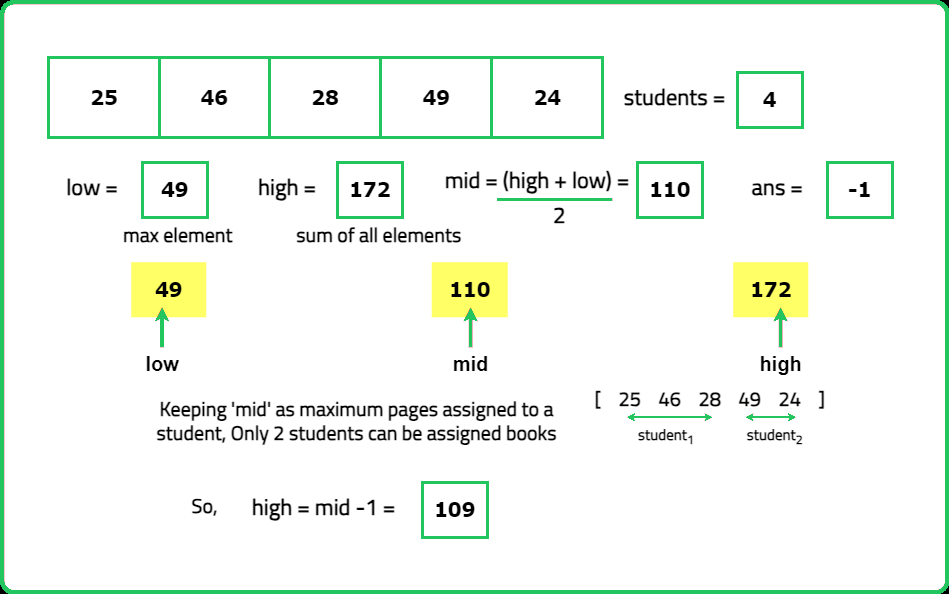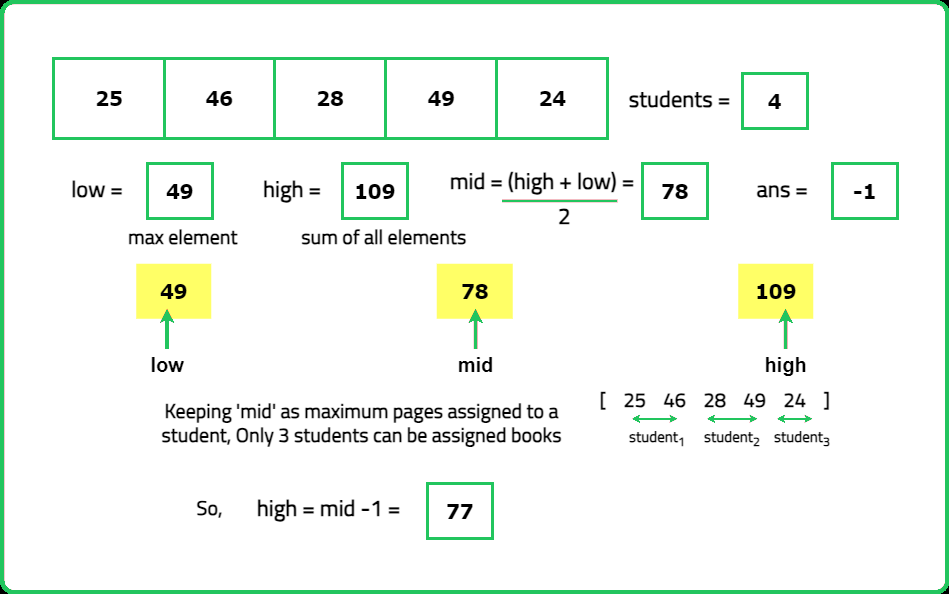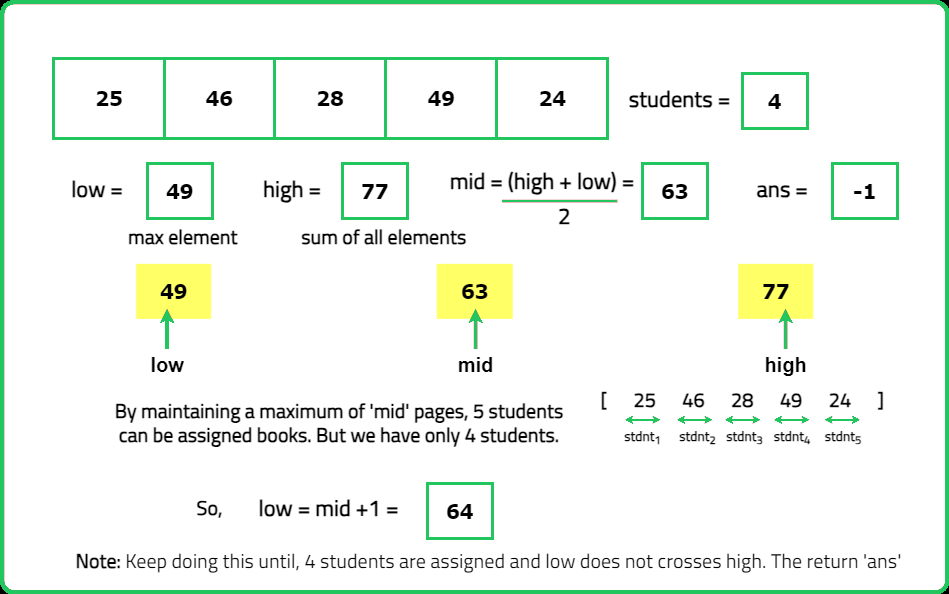12345678910111213141516171819202122232425262728293031323334353637383940414243444546474849505152535455565758596061626364656667
#include <bits/stdc++.h>
using namespace std;
class Solution {
private:
/* Function to count the number of
students required given the maximum
pages each student can read */
int countStudents(vector<int>& nums, int pages) {
// Size of array
int n = nums.size();
int students = 1;
int pagesStudent = 0;
for (int i = 0; i < n; i++) {
if (pagesStudent + nums[i] <= pages) {
// Add pages to current student
pagesStudent += nums[i];
} else {
// Add pages to next student
students++;
pagesStudent = nums[i];
}
}
return students;
}
public:
/*Function to allocate the book to ‘m’
students such that the maximum number
of pages assigned to a student is minimum */
int findPages(vector<int>& nums, int m) {
int n = nums.size();
// Book allocation impossible
if (m > n) return -1;
// Calculate the range for binary search
int low = *max_element(nums.begin(), nums.end());
int high = accumulate(nums.begin(), nums.end(), 0);
// Linear search for minimum maximum pages
for (int pages = low; pages <= high; pages++) {
if (countStudents(nums, pages) == m) {
return pages;
}
}
return low;
}
};
int main() {
vector<int> arr = {25, 46, 28, 49, 24};
int n = 5;
int m = 4;
// Create an instance of the Solution class
Solution sol;
int ans = sol.findPages(arr, m);
// Output the result
cout << "The answer is: " << ans << "\n";
return 0;
}
123456789101112131415161718192021222324252627282930313233343536373839404142434445464748495051525354555657585960616263646566
import java.util.*;
class Solution {
/*Function to count the number of
students required given the maximum
pages each student can read*/
private int countStudents(int[] nums, int pages) {
// Size of array
int n = nums.length;
int students = 1;
int pagesStudent = 0;
for (int i = 0; i < n; i++) {
if (pagesStudent + nums[i] <= pages) {
// Add pages to current student
pagesStudent += nums[i];
} else {
// Add pages to next student
students++;
pagesStudent = nums[i];
}
}
return students;
}
/* Function to allocate the book to ‘m’
students such that the maximum number
of pages assigned to a student is minimum*/
public int findPages(int[] nums, int m) {
int n = nums.length;
// Book allocation impossible
if (m > n) return -1;
// Calculate the range for search
int low = Integer.MIN_VALUE;
int high = 0;
for(int i = 0; i < n; i++){
low = Math.max(low, nums[i]);
high = high + nums[i];
}
// Linear search for minimum maximum pages
for (int pages = low; pages <= high; pages++) {
if (countStudents(nums, pages) == m) {
return pages;
}
}
return low;
}
public static void main(String[] args) {
int[] arr = {25, 46, 28, 49, 24};
int m = 4;
// Create an instance of the Solution class
Solution sol = new Solution();
int ans = sol.findPages(arr, m);
// Output the result
System.out.println("The answer is: " + ans);
}
}
12345678910111213141516171819202122232425262728293031323334353637383940414243444546474849505152535455
class Solution:
"""Function to count the number of
students required given the maximum
pages each student can read"""
def countStudents(self, nums, pages):
# Size of array
n = len(nums)
students = 1
pagesStudent = 0
for i in range(n):
if pagesStudent + nums[i] <= pages:
# Add pages to current student
pagesStudent += nums[i]
else:
# Add pages to next student
students += 1
pagesStudent = nums[i]
return students
"""Function to allocate the book to ‘m’
students such that the maximum number
of pages assigned to a student is minimum"""
def findPages(self, nums, m):
n = len(nums)
# Book allocation impossible
if m > n:
return -1
# Calculate the range for binary search
low = max(nums)
high = sum(nums)
# Linear search for minimum maximum pages
for pages in range(low, high + 1):
if self.countStudents(nums, pages) == m:
return pages
return low
if __name__ == "__main__":
arr = [25, 46, 28, 49, 24]
m = 4
# Create an instance of the Solution class
sol = Solution()
ans = sol.findPages(arr, m)
# Output the result
print("The answer is:", ans)
123456789101112131415161718192021222324252627282930313233343536373839404142434445464748495051525354555657585960616263
class Solution {
/* Function to count the number of
students required given the maximum
pages each student can read */
countStudents(nums, pages) {
// Size of array
let n = nums.length;
let students = 1;
let pagesStudent = 0;
for (let i = 0; i < n; i++) {
if (pagesStudent + nums[i] <= pages) {
// Add pages to current student
pagesStudent += nums[i];
} else {
// Add pages to next student
students++;
pagesStudent = nums[i];
}
}
return students;
}
/* Function to allocate the book to ‘m’
students such that the maximum number
of pages assigned to a student is minimum */
findPages(nums, m) {
// Size of array
let n = nums.length;
// Book allocation impossible
if (m > n) return -1;
let low = Math.max(...nums);
let high = nums.reduce((a, b) => a + b, 0);
// Linear search for minimum maximum pages
for (let pages = low; pages <= high; pages++) {
if (this.countStudents(nums, pages) === m) {
return pages;
}
}
return low;
}
}
function main() {
let nums = [25, 46, 28, 49, 24];
let m = 4;
// Create an instance of the Solution class
let sol = new Solution();
let ans = sol.findPages(nums, m);
// Output the result
console.log("The answer is:", ans);
}
// Call the main function
main();


